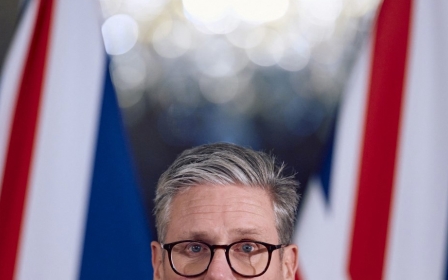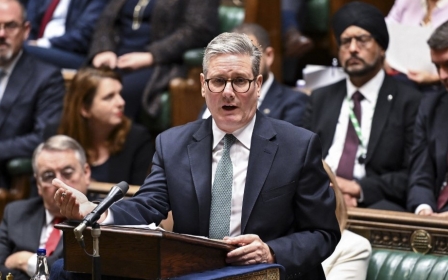Keir Starmer has previously argued Serbia waged genocide against Croatia

A 2014 video of Keir Starmer arguing that Serbia committed genocide against Croatia has resurfaced, prompting further scrutiny of the British prime minister's denial that Israel is committing the same crime in Gaza.
Last week, Starmer was asked in parliament to share his definition of genocide and to outline what action he was taking to save the lives of people in Gaza.
In response, he said he was "well aware of the definition of genocide" and that this explains why he has "never described or referred to [the situation in Gaza] as genocide".
His remarks followed similar denials from Foreign Secretary David Lammy, who suggested that Israel is not committing genocide in Gaza because millions of people have not been killed.
As a human rights lawyer, Starmer was part of the legal team representing Croatia before the International Court of Justice (ICJ), in a case where both Serbia and Croatia accused each other of violating the 1948 Genocide Convention.
New MEE newsletter: Jerusalem Dispatch
Sign up to get the latest insights and analysis on Israel-Palestine, alongside Turkey Unpacked and other MEE newsletters
The total death toll in the Serbia-Croatia conflict of 1991-1995 was 20,000 people, mostly Croatians.
In the Croatian city of Vukovar, which was besieged and occupied by Serbs for three months in 1991, an estimated 260 Croat men were killed.
In his 2014 speech before the court, Starmer made the same arguments that people today use to describe Israel's conduct in Gaza as genocide.
“You need to look at the situation in its entirety, not salami slices of individual responsibility,” he said, arguing for the need to establish “state responsibility for the conduct as a whole”.
This is the same argument made by the UN’s special rapporteur on the occupied Palestinian territories, who argued in a report in October that Israel’s actions should be viewed holistically as a settler-colonial campaign to destroy Palestinians as a group, rather than in the narrow lens of international humanitarian law.
“The motive of the Serbian leadership was to dominate one third of the Croatian territory, but the means of this territorial acquisition reveals the intent of the Serbian leadership and JNA [Yugoslav People’s Army]… to permanently eradicate the Croatian population,” Starmer argued.
Starmer said the Serbian attacks did not qualify as an armed conflict with military objectives, but that it was a “radically disproportionate” attack aimed at destroying the town and its civilian population.
The court ended up dismissing the case, and did not rule in favour of either side.
It held that "the aim of the crimes committed against ethnic Croats appeared to have been the forced displacement of the majority of the Croat population in the regions concerned, not its physical or biological destruction".
In his legal argument that Serbia’s siege of Vukovar amounted to genocide, Starmer said the city was reduced to rubble, and endured a “sustained campaign of shelling, systematic expulsion, denial of food, water, electricity, sanitation and medical treatment”.
This is in stark contrast to his previous remarks on the Gaza siege, where he suggested that Israel's cutting of water and power from the population of Gaza may be justified in situations of self-defence.
Starmer has also recognised the murder of 8,000 Muslim men in Srebrenica in 1995 as “an inhuman genocide”, and said that it should “help us find the courage and conviction to stand up and say, never again”.
He has also previously called on the ICJ to develop the law to extend protection from genocide, after it didn’t rule that the atrocities in Vukovar amounted to genocide.
When approached by Middle East Eye for comment, Starmer's office referred the request to the foreign office.
A spokesperson of the foreign office reiterated the same remarks shared with MEE earlier this week, saying genocide should be declared by a competent court after consideration of evidence in a judicial process.
'Genocide denier'
On Monday, an alliance of five independent MPs, including former Labour leader Jeremy Corbyn, wrote to the prime minister to ask whether he received any legal advice before declaring his opinion about the situation in Gaza, where more than 43,000 Palestinians have been killed.
They wrote that the government’s “flippant denial of genocide egregiously downplays the suffering of Palestinians and shows contempt for international law”.
The alliance also sent a letter to the attorney general, asking him whether he has offered any legal advice to Starmer about the definition of genocide in this case.
They cited three interim rulings by the ICJ this year recognising the plausibility of genocide in Gaza, and a UN committee report on 14 November concluding that Israel's policies "are consistent with the characteristics of genocide".
The UN’s special rapporteur on the occupied Palestinian territories, Francesca Albanese, last week accused Lammy of being a “genocide denier” for refusing to acknowledge that the situation in Gaza may amount to genocide.
Lammy's office told Middle East Eye that the determination of a case of genocide must be first declared by a court of law, rather than government officials or NGOs.
Albanese later denounced Starmer’s statements on genocide in Gaza as problematic, saying they seem to suggest that 7 October may justify Israel’s subsequent devastating war on Gaza.
Middle East Eye delivers independent and unrivalled coverage and analysis of the Middle East, North Africa and beyond. To learn more about republishing this content and the associated fees, please fill out this form. More about MEE can be found here.





